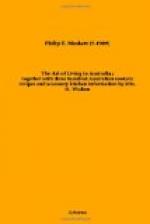“Most of our vineyard labourers come from the cold parts of Europe, such as Switzerland, where grapes ripen with difficulty under ordinary circumstances, and where the vine does not take any considerable development. There, short pruning has to be resorted to in order to make a drinkable wine. When these men arrive in Australia they bring all their old habits and prejudices with them, and tell the inexperienced vineyard proprietor that long pruning weakens the vine. The proprietor, thinking that they know more about the subject than he does, allows them to do as they like, and they set to work to cut the vine down to such an extent that, unable to take advantage of the genial climate to which it has been transplanted, it gives only one-eighth or one-tenth of the quantity of grapes it could be made to bear with intelligent pruning, besides being much weakened; whereas long-pruning strengthens a vine if the climate be favourable to its development.
“Another disadvantage of short pruning in warm climates is the well-known fact that the less grapes you have on the vine, the more glucose the must will contain; therefore, instead of making much more per acre of a drinkable wine, which they easily could do, they content themselves with a much smaller quantity per acre of a wine which ferments so badly that alcohol has to be added to prevent the production of lactic acid, resulting from the excessive temperature reached during fermentation favouring the development of this particular germ.
“The resulting wine, a curious mixture of alcohol, sugar, lactic acid, and water, is most unpalatable, sour, uninviting, and unwholesome. besides ruining the name of Australian wine when sold as such.
“I may here warn vine-growers against the advice given to them by some would-be authorities, who tell them they can make a light wine by picking grapes before they are ripe. This is absurd. The unripe grape contains a certain percentage of vegetable acids, such as tartaric, malic, &c., &c. some of which are themselves converted into glucose during the process of ripening, whilst others are eliminated after helping to transform the starch of the vegetable tissues into glucose. It stands to reason that if the fruit be picked before complete maturity, these acids, which are not capable of fermenting, will be found unchanged in the wine produced, thereby rendering it acid and undrinkable. It is, of course, necessary, in warm climates, to pick the grapes before they get over-ripe or shrivel up; but it would be just as foolish to rush to the other extreme, and pick the fruit too soon.
“If, instead of blindly following the mode of culture which has been adopted in a cold climate, the vine-grower would listen to the dictates of reason, and were to try a few inexpensive experiments, he would soon find out his mistake, and confer a boon on himself as well as on his neighbour, not to speak of the consumers of his wine.




